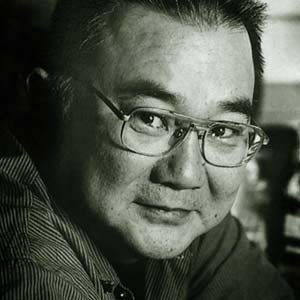- Takeshi Kaikō
Infobox Writer
name = Kaikō Takeshi

caption = Kaikō Takeshi
birthdate = birth date|1930|12|30|df=y
birthplace =Osaka ,Japan
deathdate = death date and age|1989|12|9|1930|12|30|df=y
deathplace =Chigasaki, Kanagawa ,Japan
occupation = writer, journalist
genre = novels, short stories, essays
movement =
notableworks =
influences =
influenced =nihongo|Takeshi Kaikō|開高 健| "Kaikō Takeshi" |extra=
30 December 1930 –9 December 1989 was a prominent post-World War II Japan ese novelist, short-story writer, essayist,literary critic , andtelevision documentary writer. He was distinguished by his knowledge, intellect, sense of humor and conversational skills, and although his style has been criticized as wordy and obtuse, he was one of the more popular Japanese writers in the lateShowa period . His pen name was Kaikō Ken, which is written with the same "kanji ".Early life
Kaikō was born in the Tennoji Ward of
Osaka as the son of an elementary school teacher. In 1948, he enrolled in the Law Department ofOsaka City University , but was often absent from class, as he had to take a variety of part-time jobs in order to pay for his tuition. While in school, rather than study law he was sidetracked by the works ofMotojirō Kajii ,Mitsuharu Kaneko andAtsushi Nakajima . He also translated the works ofSherwood Anderson andLouis Aragon into Japanese. He graduated in 1953 and moved toTokyo , where he took a job with Kotobukiya (the presentSuntory ), where he worked in the public-relations department.He married
Yōko Maki , a poet.Literary career
Kaikō published his first work, "Na no nai machi" (Nameless City, 1953) in the
literary magazine "Kindai Bungaku" soon after his move to Tokyo. It was largely ignored by critics. However, his second work, a short story titled "Panniku" (Panic, 1957) published in the "Shin Nippon Bunkaku", caused a sensation for its unusual concept and style. It was a story about a dedicated forester in a rural prefecture of Japan, who struggles against government incompetence and corruption. Kaikō wrote the story as a satiricalallegory comparing human beings to mice.Kaikō won the prestigious
Akutagawa Prize in 1957 with his "Hada no ōsama" (The Naked King), a story critical of the pressures placed on school children by Japan's educational system.Kaikō is considered a
leftist activist, respected in many Indochinese countries, in particular, for his vocal opposition toJapan 's support of theUnited States politics in Indochina in the 1960s. He was one of the founders of the "Beheiren " ("Betonamu ni heiwa o! Shimin rengo"), or theLeague for Peace in Vietnam . This activity was related to his experience as awar correspondent inVietnam with the "Asahi Shimbun ;" he was briefly imprisoned by theViet Cong . These experiences translated into his novel, "Kagayakeru yami" (Into a Black Sun, 1968), an account of a Japanese journalist experiencing first-hand the life of the Americans and South Vietnamese troops in Vietnam. The novel won the prestigiousMainichi Book Award .However, Kaikō had a wide range of topics in his repertory. "Natsu no yami" (Darkness in Summer, 1971) was essentially a romance between a reporter and an expatriate Japanese woman living in Europe.
Kaikō enriched the
Japanese language with the word "apache", to denote scavengers of recyclables, described in his novel, "Japan's Threepenny Opera ".Considered a gourmet, in his later years we wrote numerous essays on food and drink, as well as appearing on food-related or fishing-related
TV show s and inTV commercial .He died of
esophageal cancer . His grave is at the Shorei-in sub-temple of theEngakuji Temple complex,Kamakura, Kanagawa .Legacy
His former house in
Chigasaki, Kanagawa has been preserved as a memorial museum.References
* Powell, Irena. "Japanese Writer in Vietnam: The Two Wars of Kaiko Ken (1931-89)." Modern Asian Studies, Vol. 32, No. 1 (Feb., 1998), pp. 219-244
Bibliography
*"
Japan's Threepenny Opera ", 1959.*English translations
**"Into a Black Sun", (English language edition: Kodansha America (1981). ISBN 0-87011-428-X
**"Five Thousand Runaways" Dodd, Mead (1987)
**"Darkness in Summer" (with Cecilia Segawa Seigle), Peter Owen (1989). ISBN 0-7206-0725-6
**"Giants and Toys", in: "Made in Japan and Other Japanese Business Novels", transl.: Tamae K. Prindle. (1990). ISBN 0-87332-772-1
**"A Certain Voice" in: "Mother of Dreams and Other Short Stories", ed. by Makoto UedaExternal links
* [http://kaiko.jp/kinenkan/ Kaiko Takashi Memorial Museum, Chigasaki, Kanagawa (Japanese site)]
* [http://www.horror-house.jp/e/cat4/takeshi-kaiko-19301989.html Takeshi Kaiko's grave]
Wikimedia Foundation. 2010.
